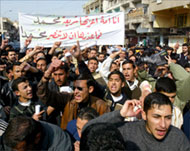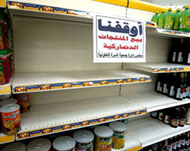More papers join cartoon furore
Both a French and a German newspaper have reprinted a series of 12 Danish newspaper cartoons depicting Prophet Muhammad that have sparked protests in the Muslim world.

With a mounting diplomatic storm, calls for a boycott of Danish goods and flag-burning protests, Danish security police met Muslim religious leaders in an attempt to contain any domestic reaction to cartoons first run by the Jyllands-Posten paper.
Police said they had won a pledge from Denmark’s imams to work to prevent an escalation of the row while the France Soir daily said it had published the cartoons in the name of freedom of expression and to fight religious intolerance.
“Because no religious dogma can impose its view on a democratic and secular society, France Soir publishes the incriminated cartoons,” the paper said.
Under a headline “Yes, we have the right to caricature God”, the paper ran a front page cartoon with Buddha, the Christian and Jewish Gods and Prophet Muhammad sitting on a cloud above Earth, with the Christian God saying: “Don’t complain Muhammad, we’ve all been caricatured here.”
Unapologetic
France Soir, which is in financial difficulties and looking for a buyer, devoted two inside pages to the Danish cartoons, with editor Serge Faubert unapologetic.
|
“There is no right to protection from satire in the West; there is a right to blasphemy” |
“Enough lessons from these reactionary bigots! There is nothing in these incriminated cartoons that intends to be racist or denigrate any community as such,” he wrote in a commentary.
“Some are funny, others less so. That’s it. That is why we have decided to publish them.”
The German Welt daily put one of the drawings on its front page on Wednesday, saying the picture was “harmless” and regretting that the Danish Jyllands-Posten daily had apologised for causing offense.
“Democracy is the institutionalised form of freedom of expression,” the paper said in a front-page commentary.
“There is no right to protection from satire in the West; there is a right to blasphemy.”
Outcry
The cartoons caused an uproar in the Arab and Muslim world.
 |
|
There have been protests across |
Thousands of Palestinians protested against Denmark for allowing publication of the cartoons and Arab ministers called on it to punish the newspaper that first printed them.
Saudi Arabia has recalled its ambassador from Copenhagen and Libya has closed its embassy.
Qatar condemned the cartoons.
Jyllands-Posten has apologised for any hurt caused, but the government says it cannot tell free media what to do.
Business losses
Danish-Swedish dairy product maker Arla Foods, with annual Middle East sales of 3 billion Danish crowns ($488 million), said it was talking to unions about 140 job cuts due to the
boycott.
 |
|
Some Arab countries have pulled |
“We are losing around 10 million crowns per day at the moment,” a spokeswoman said.
The world’s biggest maker of insulin, Novo Nordisk, said it was also hit as pharmacies and hospitals in Saudi Arabia have avoided its products since Saturday.
Islam sees images of its prophet as disrespectful and caricatures as blasphemous. One of the drawings published in September seemed to portray Prophet Muhammad as a terrorist.
A Norwegian paper has also reprinted the cartoons this year.
French Muslims quiet
There was no comment on the France Soir move from the leaders of the French Council of the Muslim Faith (CFCM), a body set up to represent France’s 5 million Muslims.
French relations with Muslims have been strained by a 2004 law banning religious symbols in state schools, which prohibited the wearing of Muslim headscarves, Jewish skullcaps and large Christian crosses in secular state schools.
Meanwhile, media watchdog Reporters Without Borders (RSF) voiced alarm on Wednesday over a call by Arab states for Denmark to punish the authors of newspaper cartoons depicting Prophet Muhammad.
Media rights
RSF Secretary General Robert Menard told AFP he was “extremely worried by the reaction of Arab regimes, which betrays a lack of understanding of the nature of press freedom.”
Muslim anger over the 12 caricatures has boiled over into a diplomatic crisis threatening Danish trade relations with the Muslim world.
|
Press freedom extends “to include the publication of information that is shocking for the population. The European Court of Human Rights says so. It is an essential accomplishment of democracy,” he argued. Robert Menard |
Commenting on a call issued by Arab interior ministers for Copenhagen to “firmly sanction” the cartoons’ authors, Menard said “the reaction shows very well the idea that they have (of press-government relations) when they ask the Danish government to intervene.”
Arab regimes “do not understand that there can be a complete separation between what is written in a newspaper and what the Danish government says,” Menard told AFP.
Denmark ranks among the world’s top four or five countries in terms of respect for press freedom, according to the Paris-based RSF.
On the broader question of whether the Jyllands-Posten was right to have published the cartoons, Menard said “there was no need for discussion.”
Press freedom extends “to include the publication of information that is shocking for the population. The European Court of Human Rights says so. It is an essential accomplishment of democracy,” he argued.
“All the countries in Europe should be behind the Danes and the Danish authorities to defend the principle that a newspaper can writes what it wishes to … even if it offends people,” he said.
Anti-Muslim protests
Also on Wednesday, police in Copenhagen said they were bracing for anti-Muslim protests in the Danish capital in reaction to Muslim anger over the cartoons’ publication.
Deputy police director Mogens Kjaergaard Moeller said: “We are aware that there are calls from several groups circulating, notably on the internet, for protests. We are ready.”
He said he was aware of “rumours” that Danish right-wing youths were planning anti-Muslim protests in the central Town Hall Square, but police had not received a request for permission to hold a demonstration.
“Obviously … we are watching what is happening very closely. That is reflected in our current security level in Copenhagen,” he said.
“We are maintaining the very high level that we already have in place,” he added.
According to Danish news agency Ritzau, Danish youths may burn copies of the Quran in order to demonstrate their “distance to Islam”.
The protest could also be held on Saturday.